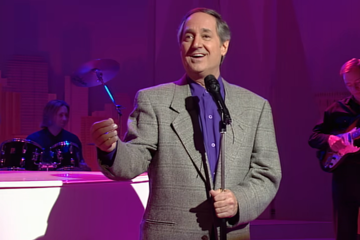Neil Young and Joni Mitchell have both removed their music from Spotify following the platform not removing deadly vaccine misinformation via the controversial Joe Rogan Experience.
Young's actions followed an open letter from hundreds of medical professionals, urging Spotify to remove the content from its website, specifically a podcast episode with Dr. Robert Malone, where the guest made a series of widely disputed claims about the COVID-19 vaccine.
On the platforming of these ideas, Young stated: “Most of the listeners hearing the unfactual, misleading, and false COVID information on Spotify are 24 years old, impressionable, and easy to swing to the wrong side of the truth. They unfortunately are wrong. I knew I had to try to point that out."
Mitchell followed in Young's footsteps, requesting to have her music removed from the platform.
"I’ve decided to remove all my music from Spotify," she said.
"Irresponsible people are spreading lies that are costing people their lives. I stand in solidarity with Neil Young and the global scientific and medical communities on this issue."
Yesterday, Spotify founder and current CEO Daniel Ek published an open letter in response to the criticism of the platform.
While the letter does hint at changes to their content policy, there is no mention of Spotify removing the controversial episodes off their platform.
You can read an excerpt of the letter below, or in full where it was first published HERE.
Don't miss a beat with our FREE daily newsletter
"You’ve had a lot of questions over the last few days about our platform policies and the lines we have drawn between what is acceptable and what is not. We have had rules in place for many years but admittedly, we haven’t been transparent around the policies that guide our content more broadly. This, in turn, led to questions around their application to serious issues including COVID-19.
Based on the feedback over the last several weeks, it’s become clear to me that we have an obligation to do more to provide balance and access to widely-accepted information from the medical and scientific communities guiding us through this unprecedented time. These issues are incredibly complex. We’ve heard you – especially those from the medical and scientific communities – and are taking the following steps:
- Today we are publishing our long-standing Platform Rules. These policies were developed by our internal team in concert with a number of outside experts and are updated regularly to reflect the changing safety landscape. These are rules of the road to guide all of our creators—from those we work with exclusively to those whose work is shared across multiple platforms. You can now find them on our newsroom, and they’ll live permanently on the main Spotify website. They are being localized into various languages to help our users understand how Spotify assesses all content on our platform.
- We are working to add a content advisory to any podcast episode that includes a discussion about COVID-19. This advisory will direct listeners to our dedicated COVID-19 Hub, a resource that provides easy access to data-driven facts, up-to-date information as shared by scientists, physicians, academics and public health authorities around the world, as well as links to trusted sources. This new effort to combat misinformation will roll out to countries around the world in the coming days. To our knowledge, this content advisory is the first of its kind by a major podcast platform.
- We will also begin testing ways to highlight our Platform Rules in our creator and publisher tools to raise awareness around what’s acceptable and help creators understand their accountability for the content they post on our platform. This is in addition to the terms that creators and publishers agree to governing their use of our services."















